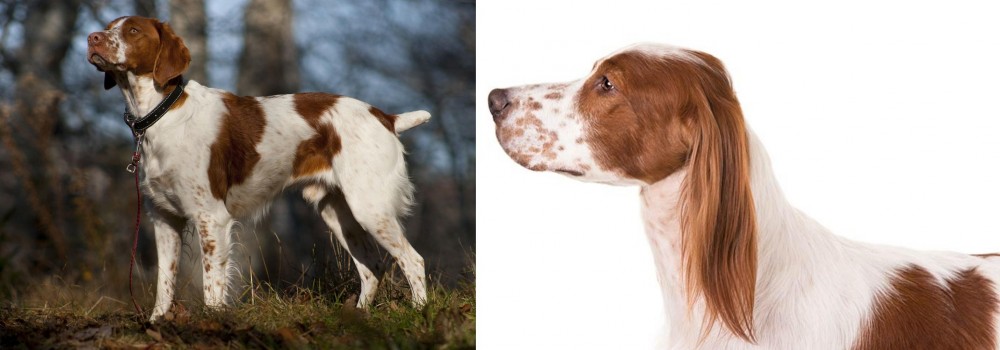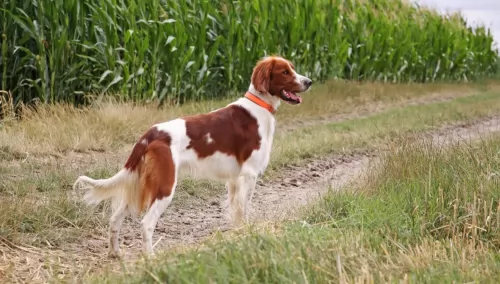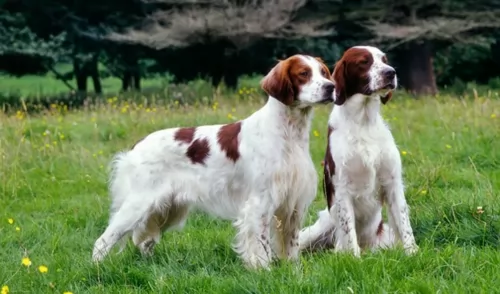 Petzlover
Petzlover Brittany is originated from France but Irish Red and White Setter is originated from Ireland. Brittany may grow 9 cm / 3 inches shorter than Irish Red and White Setter. Brittany may weigh 14 kg / 30 pounds lesser than Irish Red and White Setter. Both Brittany and Irish Red and White Setter has almost same life span. Both Brittany and Irish Red and White Setter has almost same litter size. Brittany requires Low Maintenance. But Irish Red and White Setter requires Moderate Maintenance
Brittany is originated from France but Irish Red and White Setter is originated from Ireland. Brittany may grow 9 cm / 3 inches shorter than Irish Red and White Setter. Brittany may weigh 14 kg / 30 pounds lesser than Irish Red and White Setter. Both Brittany and Irish Red and White Setter has almost same life span. Both Brittany and Irish Red and White Setter has almost same litter size. Brittany requires Low Maintenance. But Irish Red and White Setter requires Moderate Maintenance
 One of the most intense bird dog breeds in existence is the Brittany, bred for hunt. The breed used to be called the Brittany Spaniel, but since the breed is closer to a setter or pointer, that moniker has been dropped. The Brittany is named for the French Province in which they were originally developed. Sometime from the 17th to the 19th centuries, the breed was developed. Images of a very similar dog can be found on 17th century paintings and tapestries. However, the first written description comes from 1850 by a Reverend Davies, describing a hunting episode. The breed was recognized officially in the early part of the 20th century and made a splash at the 1900 Paris Dog Show.
One of the most intense bird dog breeds in existence is the Brittany, bred for hunt. The breed used to be called the Brittany Spaniel, but since the breed is closer to a setter or pointer, that moniker has been dropped. The Brittany is named for the French Province in which they were originally developed. Sometime from the 17th to the 19th centuries, the breed was developed. Images of a very similar dog can be found on 17th century paintings and tapestries. However, the first written description comes from 1850 by a Reverend Davies, describing a hunting episode. The breed was recognized officially in the early part of the 20th century and made a splash at the 1900 Paris Dog Show.
The first official standards were written in about 1907 and the breed was recognized by the American Kennel Club (AKC) in 1934.The Brittany is expected to point to and then retrieve birds and other small ground game. Because the Brittany both points and retrieves they are known in the U.K. as a Hunt, Point and Retrieve breed or an HPR, and they have more Dual Champions than the rest of the AKC Sporting group.
There are actually two types of Brittanys in the minds of many breeders. There is the “French” Brittany and the “American” Brittany. When the breed arrived in the United States in 1931 they became immensely popular in a short period of time. In 1942 American Breeders began the American Brittany Club, rewriting the French standard to fit the dog they knew. Today there are definitely difference between the two sub-sets that can easily be seen. The French dog is smaller than the American dog. The American dog is a runner pacing ahead of the hunter while the French dog works more closely with their human companions. Another visible difference is that the French accept black spotted Brittanys, while in the United States a black spotted coat is considered a fault. Both sub-sets are known for their willingness to follow human directions, their eagerness for the hunt, and their agility and speed.
Unfortunately, the European wars took their toll on this breed as they did on many others. Following the second World War, their numbers in Europe were drastically reduced. The French had stop breeding them altogether during the war. It was in this depleted gene pool that the French agreed to accept the black spotted Brittany. Along with the U.S., Canada also does not recognize the black spotted Brittany.
 Classified as a gun dog in the UK for hunting game birds, and as a sporting dog in the USA, the Irish Red and White Setter was available with his red and white coat. Breeders however, started focusing essentially on the red variety so that the red-and-white setter all but disappeared.
Classified as a gun dog in the UK for hunting game birds, and as a sporting dog in the USA, the Irish Red and White Setter was available with his red and white coat. Breeders however, started focusing essentially on the red variety so that the red-and-white setter all but disappeared.
Fortunately, the breed was revived and considered a separate breed from the Irish Setter. He has gained recognition with all the major kennel clubs.
 The Brittany is much like other hunting dogs – pointers and retrievers – in size and stature. He is solid and strong but not heavy. He is compact with an average size head and floppy ears, docked tails or short natural tails, and expressively intelligent looking eyes. He is athletic, energetic, and alert. He has a long, elastic and free gait. The French dog is smaller and the dog with black spots is accepted. The American Brittany is larger and only a tri-color of orange, liver and white is acceptable.
The Brittany is much like other hunting dogs – pointers and retrievers – in size and stature. He is solid and strong but not heavy. He is compact with an average size head and floppy ears, docked tails or short natural tails, and expressively intelligent looking eyes. He is athletic, energetic, and alert. He has a long, elastic and free gait. The French dog is smaller and the dog with black spots is accepted. The American Brittany is larger and only a tri-color of orange, liver and white is acceptable.
 The Irish Red and White Setter is a large dog standing at between 56 – 61cm, both male and female, and weighing at around 25 to 34kg.
The Irish Red and White Setter is a large dog standing at between 56 – 61cm, both male and female, and weighing at around 25 to 34kg.
Always used as a gun dog for its speed and scent, its head is carried high and its long feathery tail is held out level with its back and then it ‘sets’ into a pose, giving its handler a clue where the bird is hiding.
The Irish Red and White Setter has a lean, muscled body which is well proportioned, being slightly more heavily built than the Irish Setter. He also has a broader head.
The coat is shortish but it has those long silky fringes which are known as feathering around the tail, chest and legs. The Irish Red and White Setter is red and white but you may find some freckling around the legs and muzzle. The ears are usually red and they are long, silky and floppy.
As gun dogs, the Irish Red and White Setter is a loyal and devoted family pet who can become a good friend of children too as they love to play. He is a lithe dog and bounding in energy, and he will therefore require a reasonably sized garden.
He will need to be trained and socialized and once trained he makes an obedient and reliable companion.
 The Brittany is particularly trainable and friendly. They love to play and are sweet-natured. They don’t due well with harsh correction though and a stern look will cause them to wither. Socialize them young or they can become shy around strangers. They are loyal and family oriented. They can easily become attached to their humans.
The Brittany is particularly trainable and friendly. They love to play and are sweet-natured. They don’t due well with harsh correction though and a stern look will cause them to wither. Socialize them young or they can become shy around strangers. They are loyal and family oriented. They can easily become attached to their humans.
 The Irish Red and White Setter is every bit as beautiful as the Red- or Irish Setter even though he may not be as well known.
The Irish Red and White Setter is every bit as beautiful as the Red- or Irish Setter even though he may not be as well known.
Setter lovers are thrilled that this beautiful, playful, well tempered dog has been saved from extinction. He has plenty of stamina to be an excellent sporting dog.
He is intelligent too and easily trained. He is an affectionate, loyal, gentle, devoted family dog and he has also got good looks on his side.
Give him the right kind of food, a warm, dry place to sleep, lots of exercise and games and your love and attention, and you’ve got a friend for life.
 The breed is a hardy one and Brittanys are mostly healthy dogs. In Europe 1 in 5 dogs dies of old age and that age is usually 14 or 15 years. They do have a few issues that they may be susceptible to. These would include:
The breed is a hardy one and Brittanys are mostly healthy dogs. In Europe 1 in 5 dogs dies of old age and that age is usually 14 or 15 years. They do have a few issues that they may be susceptible to. These would include:
 Dogs like the Setter can get chronic allergies if they’re exposed to the same food over and over again. Setters are prone to chronic allergies when exposed to a food such as soy. That is why if you’re unsure, rather speak to a dog expert about what to feed a Setter and what to avoid.
Dogs like the Setter can get chronic allergies if they’re exposed to the same food over and over again. Setters are prone to chronic allergies when exposed to a food such as soy. That is why if you’re unsure, rather speak to a dog expert about what to feed a Setter and what to avoid.
Feed your Setter foods rich in taurine to avoid heart disease. Taurine is found in chicken and red meat. You can see how important the right food is for your setter as the wrong food can cause a host of illnesses.
 Don’t overfeed your Brittany. Keep him at hunting weight by feeding a half a cup up to 2 cups per day depending on the size of your dog and activity levels. Serve this in two meals not one.
Don’t overfeed your Brittany. Keep him at hunting weight by feeding a half a cup up to 2 cups per day depending on the size of your dog and activity levels. Serve this in two meals not one.
Ears – prone to infections – make sure that you check them and wipe them out routinely to prevent infections.
Hip Dysplasia – bones don’t fit well into joints – this can be genetic or otherwise, causing lameness and arthritis. If severe it can require surgery to correct.
Epilepsy – mild or serious seizures are possible. This can be genetic/hereditary but is set off by an infectious disease of the brain, head injury, poison, tumor, or metabolic disorder. There is no cure, but medication can be very effective.
Hypothyroidism – Low levels of thyroid hormone – can cause drooping eyelids, obesity, lethargy, mental difficulties or irregular heat cycles or all of this. Medication is available as it is for humans but must be taken daily for the rest of the dog’s life
Canine Discoid Lupus Erythematosus – autoimmune disease that is rare in dogs. Cats and humans can also have it. It is a skin disease and does not become the more serious and deadly Systemic Lupus. The Discoid version of this disease causes loss of pigmentation and a scaling on the nose which can then progress to the skin around the ears, eyes and genitals. There could be ulcerated lesions and tissue death in more severe cases. Sun exposure can make the condition worse.
The Brittany is a hunting dog that acts like a pointer but will retrieve fowl and birds in the water or on land. If you don’t hunt, the Brittany can still be your family dog. They need lots of exercise and mental stimulation. They need a job if they are not going to hunt and expect them to be distracted by every bird they see. Try flyball, agility, FAST CAT, field trials and dock diving. They are very task oriented and have boundless energy. They excel at obedience and confirmation as well.
 Grooming your beautiful Irish Red and White Setter isn’t going to be a difficult task, and a good brush twice a week will ensure he stays looking his best.
Grooming your beautiful Irish Red and White Setter isn’t going to be a difficult task, and a good brush twice a week will ensure he stays looking his best.
Because he has long ears, these should be checked, especially if the dog loves to swim. Water, dust, debris and wax can build up and cause an ear infection.
His nails will also need to be trimmed if they get too long and don’t naturally wear down.
This is a beautiful dog that offers ruggedness and endurance, and essentially he needs to be a country dog or live in a home where there is a good sized garden. He loves being on the go, and is a dog that will gladly join you on your hikes, cycling trips or swimming – you can count him in.
Irish Red and White Setters are an active breed and are naturally lean and lithe, being fast runners. Make sure to give them the right food so that they maintain this muscle mass.
If in any doubt, speak to your vet to find out what is essential for a dog like this. Protein for instance is vitally important as are fats. These dogs need high amounts of energy. Vitamins and minerals are also very important for keeping a dog healthy and strong.
Try and include some nutritious home-made food into his kibble such as cooked chicken, brown rice and vegetables as well as some raw meat occasionally. These dogs can develop horrible skin allergies if they don’t get in some raw meat from time to time.
Fresh, cool water should be constantly available to your pet.